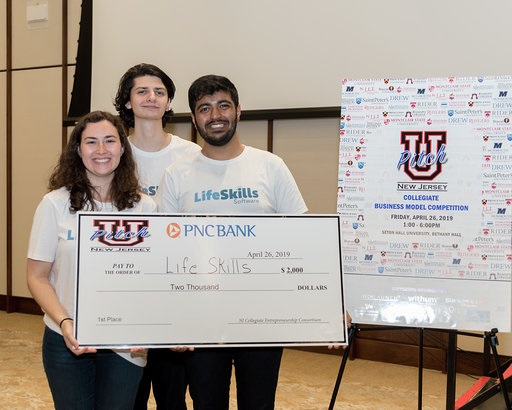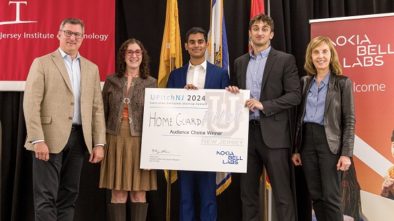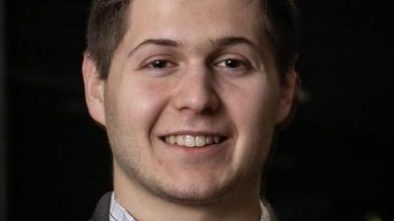Stevens-Based “Life Skills Software” Captures First Place at UPitchNJ Competition
Nicholas Gattuso III was a high school freshman in Point Pleasant Borough seven years ago when he volunteered for a computer science project in a special needs class.
He quickly spotted a problem: “They had computers, but they weren’t using them because there wasn’t software built out specifically for special needs classrooms.”
Gattuso returned to his computer science class with an idea. He created short video games that helped the students with learning disabilities to improve their spelling skills, handle money and shop on a budget.
It was a solution that led to a startup called “Life Skills Software” (Hoboken), and to a first-place finish at the fourth annual UPitchNJ competition, held on April 26 at Seton Hall University.
The New Jersey collegiate business model competition included teams from Rowan, Monmouth, Montclair State, Rutgers, Fairleigh Dickenson, Seton Hall, Princeton, Rider and William Paterson universities, as well as NJIT, Ramapo College and Stevens Institute of Technology.
UPitchNJ is sponsored by the New Jersey Collegiate Entrepreneurship Consortium, which represents the entrepreneurship education programs at New Jersey’s four-year colleges and universities. The inaugural UPitchNJ was held at Rutgers University in 2016.
With the win, Gattuso and his partners — Mary McKeon, Khayyam Saleem, Jarrod Smeyers and Robert Spillane II — all of them from Stevens Institute of Technology, took home the top prize of $2,000 from sponsor PNC Bank. They also won coaching sessions with TechLaunch founder Mario Casabona and David Sorin, partner at the law firm McCarter & English.
“We feel fantastic. It puts us in a really good position to set off this summer,” said Saleem. “We were planning on running an independent experiment with one of our schools to try to see the actual efficacy of our product, and that is the perfect amount of money to really get us going and ensure that we have a great hypothesis, great results, and that it will really help us refine our product.”
McKeon said that Life Skills was seeking $250,000 for marketing, further game development and the addition of 50 more schools to their platform.
The competition was close. Clark Smith, senior venture officer at the New Jersey Economic Development Authority, and one of six judges hearing the pitches, noted, “All of the teams were really impressive, with professional-level presentations from everyone. The winners just were a little bit sharper with their business models. We liked their target market and how far they have come with that product, along with their potential to grow that business.”
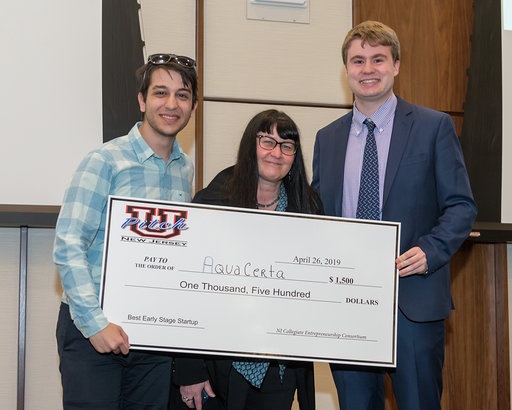
Joy Yagid / Seton Hall University
Other winners included Princeton University students Dimitris Ntaras, Aditya Shah and Ryan Thorpe, who received UPitchNJ’s award for Best Early Stage Startup.
The name of their startup is AquaCerta. They created a water filtration system that relies on cattle bone to remove dangerous microbes and heavy metals such as nickel, lead and copper from drinking water.
“We really want these devices to be as affordable as possible because some of these people who don’t have access to clean water really are in stressful financial situations,’’ Thorpe said.
They plan to work at Princeton Innovation Center BioLabs, while testing the water in Trenton and Flint, Michigan, they said.
Their award came with a $1,500 check and a coaching session with Greg Olsen, entrepreneur-in-residence at Princeton’s Keller Center.
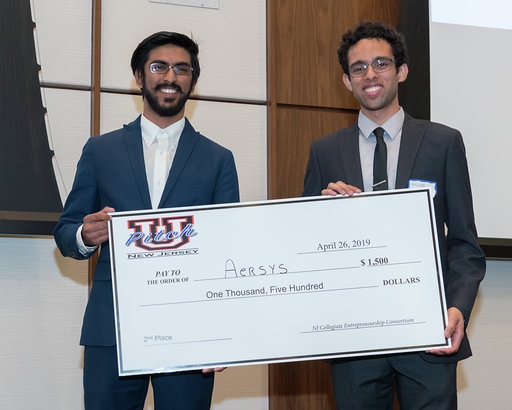
Vallab Nayak, from Rutgers University, and his teammates Hariharan Vijayakumar, Tujas Ravindra, Shreyas Ravindra and Nicholas Delello finished in second place with their startup, Aersys.
They won $1,500 and coaching sessions with the New Jersey Tech Council and NJIT’s New Jersey Innovation Institute.
The startup plans to create a network of what Nayak calls “micro-fulfillment centers” for deliveries that can support every company, delivery vehicle, drone and rover.
“In five years, almost anything you want to order from a local shop, Amazon or restaurant will be delivered in 15 minutes or less, day or night, and at no cost to you,” he said.
The centers are about the size of four vending machines. “We can transfer packages to and from rovers and drones, and instead of having a few large distribution centers, we would have small ones everywhere. We could have a drone transfer a package to a rover and have a rover bring it to you or you could pick it right up at a micro-fulfillment center using a touch-screen kiosk
“Demand for low-cost delivery systems is going through the roof,” he added, noting that the current technologies won’t turn a profit until the companies automate the complete delivery process.
“Our biggest engineering challenge is to make it universally compatible. We want them to work with Kiwi rovers, Amazon Prime drones and just about every delivery vehicle,” he said.
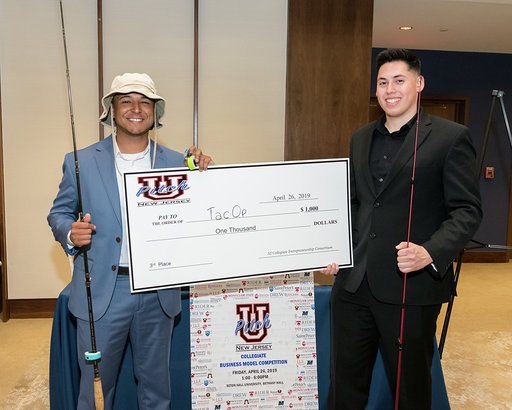
Montclair State University students Jonathan Morgan and Brett Siegmeister captured third place, winning $1,000 and a coaching session with entrepreneur David Stengle, director of Startup Grind Princeton. Their startup, TacOP, created a lure holder that prevents fishermen from hooking their fingers while changing lures.
Finally, Seton Hall University students Allison Lamoureux, Katie Mazzarelli and Annemarie Ryan won UPitchNJ’s Audience Choice Award for their Care Call software, entitling them to a $250 Amazon gift card to help improve nurse response times to patients.

